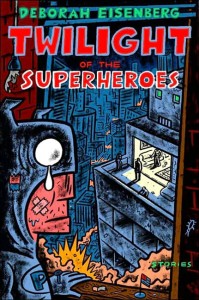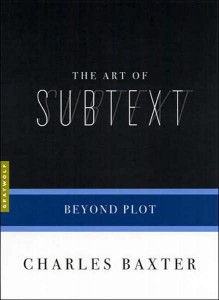 Liana Imam is a senior studying English and creative writing at the University of Michigan. She spent a semester in St Andrews, Scotland, and now finds it difficult to live in a town without cobblestones.
Liana Imam is a senior studying English and creative writing at the University of Michigan. She spent a semester in St Andrews, Scotland, and now finds it difficult to live in a town without cobblestones.
Earlier this fall, Deborah Eisenberg visited the University of Michigan as a guest writer and I had the ridiculous luck to find myself sitting in a small classroom four chairs from her. She answered students’ questions, and I did my best not to flail and knock my quite full coffee cup off the desk; I have done so more than once in the presence of greatness. That wasn’t very long ago, but there are just moments you know you’ll never forget. And I will never forget that Deborah Eisenberg once said she thought a dignified life was one you could live from your bed.
Not many people are quite so piqued by this idea as I am. There is a creeping frozen what-comes-next panic that I feel every time someone demands my anemic resume: undergraduate senior, English and creative writing major, no plans for next year, thank you for your questions. I have spent most of college waiting to be done with it, though I couldn’t say why I was so eager for an ending. I have no aspirations to a cubicle job or, really, flowers in a windowsill somewhere; get me a queen bed, good down pillows and comforter, a side table piled with books, and call it a night.
But there is still a nagging, a pull I feel. And in this state of constant anticipation, there is something itchy about the six stories in Eisenberg’s Twilight of the Superheroes, which have an almost fearsome quality. Her characters, men and women desperately in need of some kind of solace, both depress and terrify me: their lives, their confusions and unhappinesses are too near to mine for comfort. I am enamored of them, but also challenged, stopped cold and slightly bemused: what is it about these fictional people and their lives that has the power to so seriously discomfort and enchant me?
Eisenberg’s stories were still stuck in my scattered consciousness when I read Charles Baxter’s craft book, The Art of Subtext. Quite early on, he gives a tongue-in-cheek suggestion for a compelling story: “give the character exactly what s/he wants, and see what happens.” And almost immediately, it became clear that The Art of Subtext should be a kind of field manual to reading Twilight of the Superheroes. Because having what one wants, in Eisenberg, is an unexpectedly fraught condition. In many ways her characters have reached the peaks of their possibilities and apparent desires, yet they still fall short of contentment. They have college educations and brilliant parents and interesting beautiful lovers. In the collection’s end piece, “The Flaw in the Design,” the father complains to his wife that their son, Oliver, has had “attention, education, privilege.” He asks her, “What does he lack? He lacks nothing. The whole planet was designed for his well-being.” Nevertheless, it couldn’t be more plainly obvious that despite the things Oliver has, there is still a lack, still a longing.
I have sympathy for Oliver, because lately I’ve been feeling an absurdity in trying to express what I think is not there when, in reality, there is so much possibility in front of me. It feels ungrateful and selfish; Baxter points out:
…you can’t always say aloud what you really crave or desire because for some reason it’s unmentionable. You want the wrong thing, or too much of it.
Or somebody doesn’t want to hear it, or, for the time, the ostensible desires will suffice. Eisenberg’s characters all seem to exist in the moment at which they are forced to look at their abstract minds rather than their apparent lives, and personal admissions can be harsh on the retinas. There is some kind of disconnect between wishful thinking and the actuality of human desire, which can be more troubling than most of us generally care to admit. It’s Baxter’s point in stereo-surround: the things we can permit ourselves in the name of keeping up appearances are alarming.
So, unquestionably, there is the problem of admission, of having to look back and answer for actions, for sins, for anything. Eisenberg’s characters are beautiful and/or successful yet crashingly discontent, possibly because they are afflicted by a tendency to love elements of their lives for what they have been, not what they have become; they see things without turning them into what they really are. This is a particular problem for the semi-bumbling protagonist of “Some Other, Better Otto,” who cannot believe his life has passed so quickly, because “it felt that way only at moments—when Otto passed by a mirror unprepared…or when he caught a glimpse of a middle-aged person coming toward him on the street who turned into William.” Young, beautiful William’s aging has snuck up on both him and Otto, and though there is a great depth and tenderness to their relationship, it is sometimes impossible for Otto to connect himself and his lover to the people they were when they fell in love so many years ago.
Baxter describes this quality of being “conveniently blind” to the things that are closest to us: “You can see clearly and distinctly what you see, but you simply can’t be sure of what you’re looking at.” Like Eisenberg’s creations, we live inside a concept of crystallized situations, an idea of the constancy and continuance of our loved ones, but we concentrate so hard on the concept that the actuality loses focus. Post-graduation plans seem to work in the same way; by the time several of my pre-med friends finished the MCAT, they were spending at least as much time wondering why they ever wanted to go to medical school as they were filling out applications.
We have a kind of collective anxiety, my friends and I, that apparently has nothing to do, actually, with having a plan or not. Less high-brow forms than Eisenberg’s stories—metal albums, sentimental novels, blockbuster movies—have argued the merits of the journey over the destination, and similarly, in Twilight of the Superheroes the condition of a character’s arrival at an event, a mindset, is not as important as how it felt to get there. Though it’s more than this: journey-not-destination depends on the process as a way to reflect back on how nice it is, finally, to have arrived, whereas Eisenberg seems to point to the journey as an end in itself.
Quite appropriate to Eisenberg and her fraught, built-up stories, Baxter points out how heavily we rely on irony as a defense mechanism: we look at things with our “epistemological skepticism, our irony, our cynicism, our ability to be in on the joke, our occasional wish, knowing there is no ‘center’ anyway, to be swept away.” The problem is that Eisenberg’s work is already so steeped in those sarcastic dismissals that instead of looking to her for an escape, a salvation, we are forced to consider—sometimes painfully—what that salvation should be. My own writing often tries to be a sparkling vision of a life that works, or one that could, if all the pieces could be fitted together. Eisenberg, on the other hand, exploits the reality that some bits of the puzzle have been vacuumed up, and, furthermore, someone’s gone and changed the filter: sometimes essential things are lost for good, and we are forced to make do with what we can find.
The nymph of “Like it Or Not” is thought, by Harry, to be “dazzled by the primacy of her own life”; in seeming contrast, the mother in “The Flaw in the Design” feels somehow thwarted by living in a town whose population is constantly changing, always in flux—but maybe that intoxicating sort of immediacy is itself induced by transience. It feels as plausible as anything else that not making an impression is the key to happiness. This mother is more content clasping hands with a stranger in an elevator than with her husband; the girl is fluttering and trance-like as long as she is uninvolved in what she’s doing. So perhaps this is it: when you’re important, when you’ve made an impact on somebody or something, you’re forced to deal with something that is now somehow stone-set—a matter of knowledge, arguably public.
This prospect haunts Eisenberg’s Otto, who, while successful in all the traditional ways—moneyed, loved profoundly—is still unable to settle into his good fortune. At the end of the story, after a nearly unspeakable and certainly inexplicable rage at William has quelled, there is some amazement that Otto can be in his kitchen, at night, in a quiet city with the moon all around him and his beautiful lover. There is some amazement that all these things—the kitchen and the moonlight and William—have belonged to him and livened him and, actually, have supposedly contented him. “What are we doing down here?” he asks. It is that same earlier concern: How have we gotten here so quickly? How have we come to such a static happiness, which we can see and trace to its origins but cannot organize or quantify?
Though I have not reached that type of static place, I would like to think I still understand the feeling it might engender. Looking out on the last several months of my undergraduate experience, it feels as though some massive tangible space has opened up in front of me, some expanse that was once filled with a reassuring knowledge that has apparently seeped out of the world. And while this space is terrifying, it also feels safe somehow. If reassurance has gone, possibility has taken up residence in its stead. And possibility, really, is what compels us, what makes us want and push and achieve. Baxter rightly notes young writers’ apparent aversion to the very idea of plot, which can feel like a kind of snare, and inevitably “will close down certain options. It thus resembles the aging process.”
And aging is a collective concern of humanity, and certainly one of Eisenberg’s characters. Similar to Otto’s ruminations, Kate has a moment, alone in that impressive ancient Italian hotel, that she feels she must check her situation: she would like to go down to the bar, but “the fact is, women of her age were conspicuous on their own.” And I know that I am some years away from that age, but years are not what create the conspicuousness; rather, it’s that singularity and, more significantly, the acceptance of it, the lack of intimidation by it. A woman of Kate’s age is not meant to be comfortable without a man attached to her; a woman of mine should not be so cavalier about approaching the ends of eras. We’re expected to have learned what a mess those situations can make.
And, too, an end begs an assessment, which hardly seems the point. Eisenberg’s prose completely thwarts any attempts at judgments or summations because, in the literal plot sense, her stories never quite get where they’re professedly going. They balance on the knifepoint of potentially catastrophic fallout: the moment, in the title story, when Nathaniel and his friends will be shunted into post-9/11 New York City; the possibility, in “Window,” that Kristina’s obsessive boyfriend could come through one at any second. These are build-up stories, but they take you only so far. And college, in a courtship sort of way, has brought me to the Grand Central of my life, tells me there are countless trains to choose from, countless places I could go. It is only essential that I board one, or I run the risk of being pulled under the tracks. But perhaps it’s not an either/or; perhaps come May and graduation I’ll leave the station and walk. It’s a nice day out.
May is not a falling off for me simply because I have no plans; it is not the peak of something but, perhaps, the glen of new opportunity. The subtitle of Baxter’s essays is Beyond Plot, which is, of course, the hardest possible thing to consider. To consider the plotless is to consider what is unscripted and intangible: the desire we refuse to acknowledge, the future life we are terrified to even envision. The end of “The Flaw in the Design” is a borderline obsessive contemplation of the transience, the accidentalness of one’s own life; the mother seems to be desperately trying to justify herself while at the same time feeling neither remorse nor regret. Not really. She’s like an outside observer of the things she has done, which is, possibly, a lesson. Distance is important, allows perspective, lets you see things as they are and not as you have thought them to be in scrutiny. And as the mother observes, from afar things don’t look quite so desolate:
It’s as if, for a moment, you were a different person, with different eyes and different capacities and a different history—a sensation, really, that’s a lot like hope.
I don’t know that I’m exactly hopeful for myself. It seems presumptuous. And though it’s the lovely thought of a brilliant author, I doubt I would actually feel dignified lying in bed for too long. I’d get restless, flail around, the sheets would get rumpled, etc. The bed, comfortable as it is, is maybe too much so; the plotline is much too stable. So what I have found is some kind of contentment in plotlessness. There’s too much to fear from the future: crow’s feet and stretch marks and maybe even nuclear winter. So for now I want only to look for satisfaction in the potentiality of things. I haven’t found it yet, but, of course, that’s the whole point. The time spent searching, so far, has been exquisite.
Related Links
Read an excerpt from Charles Baxter’s unpublished first novel, In Hibernation, buy one of his many published novels here, and read Tim House‘s interview with the author.
Listen to Deborah Eisenberg read her story “Like It Or Not,” read an excerpt from “Twilight of the Superheroes,” check out this interview in The Stranger, and buy books by (or featuring works by) Eisenberg here.





